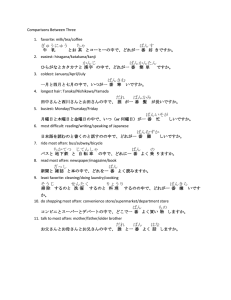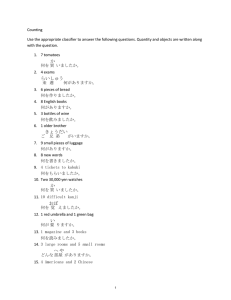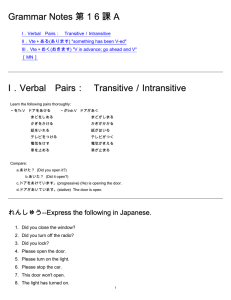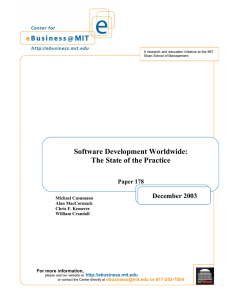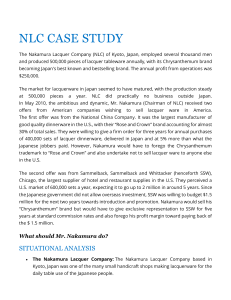Grammar Notes 第 1 2 課 A
advertisement
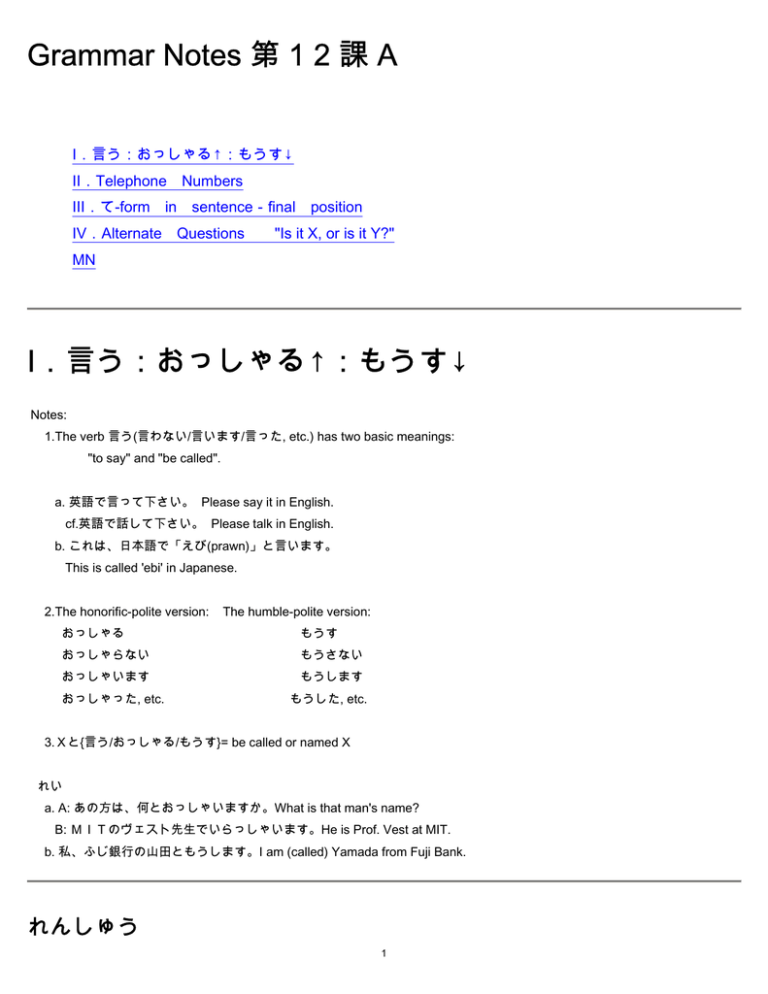
Grammar Notes 第 1 2 課 A
I.言う:おっしゃる↑:もうす↓
II.Telephone Numbers
III.て-form
IV.Alternate
in
sentence-final position
Questions
"Is it X, or is it Y?"
MN
I.言う:おっしゃる↑:もうす↓
Notes:
1.The verb 言う(言わない/言います/言った, etc.) has two basic meanings:
"to say" and "be called".
a. 英語で言って下さい。 Please say it in English.
cf.英語で話して下さい。 Please talk in English.
b. これは、日本語で「えび(prawn)」と言います。
This is called 'ebi' in Japanese.
2.The honorific-polite version:
The humble-polite version:
おっしゃる
もうす
おっしゃらない
もうさない
おっしゃいます
もうします
おっしゃった, etc.
もうした, etc.
3.Xと{言う/おっしゃる/もうす}= be called or named X
れい
a. A: あの方は、何とおっしゃいますか。What is that man's name?
B: MITのヴェスト先生でいらっしゃいます。He is Prof. Vest at MIT.
b. 私、ふじ銀行の山田ともうします。I am (called) Yamada from Fuji Bank.
れんしゅう
1
1. Please say it again slowly.
2. Would you say it in easy Japanese?
3. My father said so, too.
4. The hotel next to the COOP is called "Marriot Hotel".
5. A:What do you call this in Japanese?
B:It is called "maguro(tuna)".
6. A:What is the name of your baby?(politely)
B:Her name is "Yuki".(politely)
7. (Introducing himself...) I am Maeda, from Foreign Ministry.(politely)
II.Telephone
Numbers
Notes:
1.In presenting phone numbers orally, "4" よん, "7" なな, and "9" きゅう
are the preferred pronunciations.
2."2" is read as にい and "5" is read as ごお.
3."O" is read as ゼロ, but when it is placed between numbers or at the
the end, it can also be read as まる(meaning "circle").
れい
a..479-0123 [よんななきゅう の ゼロいちにいさん]
b.(0298)62-5130
[ゼロにいきゅうはち の ろくにい (の) ごおいちさんゼロ(orまる)]
c. Ext.105
[ないせん いちゼロ(orまる)ごお]
れんしゅう
1. A:What is your home telephone number?
B:It's 203-1158.
2. A:What is your company telephone number?
B:It's (03)3241-9770. The extension is 406.
3. A:Do you know Mr. Nakamura's phone number?
B:Yes, I do. It's 218-0075 or 76.
2
III.て-form
in
sentence-final
position
Notes:
1.て-form of a sentence may be direct-style or distal-style.
2.て-form in sentence-final position occurs when the speaker prefers
to leave the rest of the predicate unstated.
れい
a. めいしをきらしておりまして…
Having run out of my cards...(so, I cannot offer you one.)
b. A:ラップトップを買ったんですか。
B:ええ、うちでも仕事をしたいと思って…
Yes, I thought that I'd like to work at home, too...
れんしゅう--Indicate indirectly the following reasons using て-form.
1. A:おそかったですね。
B:すみません。(There was an accident, and...)
2. A:日本語を勉強しているんですか。
B:ええ。(I've been thinking that I'd like to go to Japan, and...)
3. A:田中さんはいらっしゃいませんか。
B:もうしわけございませんが、(Tanaka has gone to Kyoto on a business trip...)
IV.Alternate
Questions
"Is it X, or is it Y?"
れい
a. A:中村さんの電話ばんごう、ごぞんじですか。
Do you know Mr. Nakamura's telephone number?
B:おたくのですか。会社のですか。
The home one, or the office one?
b. 今日は早くかえりますか。(または、)おそくまで仕事をしますか。
Are you going home early, or are you working till late?
れんしゅう--Complete the following aternate questions.
3
1. 先生は、男の人ですか?______________________?
2. かいぎは、おもしろかったですか?_______________________________?
3. かれを知っていますか?___________________________?
4. 日本語で話しましょうか?___________________________?
MN
1. Exchanging name cards, めいし.
2. (一)ど
"(one) time"
A:何どぐらい日本へ行きましたか。How many times did you go to Japan?
B:二ど行きました。
I went there twice.
3. Usages of ゆっくり
a.もう一どゆっくり言って下さい。Please say it again slowly.
b.いっしょにゆっくり話しませんか。Let's talk together leisurely.
c.どうぞごゆっくり。Please take time.(or Please make yourself at home.)
4. ~によわい/つよい
a.ヒアリングによわいです。I am not good at listening.
b.かれは、さけに強いねえ。He can drink a lot.
4
MIT OpenCourseWare
http://ocw.mit.edu
21G.503 Intermediate Japanese I
Fall 2004
For information about citing these materials or our Terms of Use, visit: http://ocw.mit.edu/terms.
